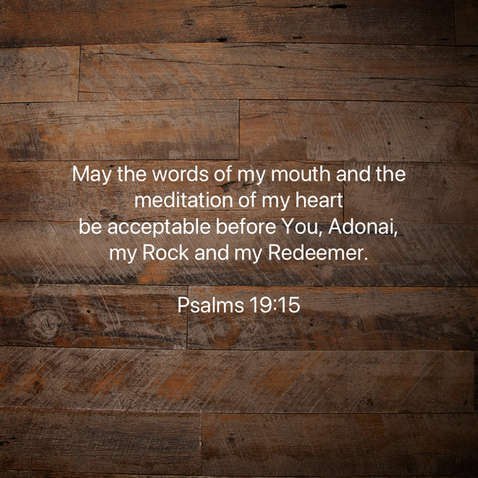|
Good morning!
We're so glad you decided to join us today! This is the first Sunday of Lent.
When we meet in person, we share our joys and concerns together. Think about the past week, and any prayer requests you may have. If you have any you would like to share, you can add them to this post as a comment. When you are ready, use the prayer below (source) to get started.
Thank You, Father, for including me as one of Your chosen servants. Enable me, in the power of the Holy Spirit and in the name of the Lord Jesus, to be a good and faithful witness to You in my earthly walk. May You be glorified and exulted in my life, and in all I say and do, I pray that I may sing forth Your eternal praises and glory, from this day forward and for evermore. AMEN.
Today's lesson is on 1 Peter 2:1-10.
Results of the Call
When we read the New Testament today, we sometimes lose sight of the fact that becoming a Christian was a huge step in that cultural and religious context. Beginning with the apostles, Christian leaders worked tirelessly to help new believers come to see themselves in a new light. They had a new identity in Christ. The 27 books of the New Testament include 2 that are ascribed to the apostle Peter. The first of these two is particularly thick with citations from and allusions to various Old Testament passages. Only Revelation has a greater percentage. Peter's audience – the members of the congregation to which he wrote- had received the gospel of Jesus Christ willingly. They had obeyed the truth, had purified their souls and had been born again. Consequently, they must resolve to live in a way that was consistent with those facts. Verse 1 What follows is called a “vice list” of five items in three groupings. Malice constitutes the first grouping. It carries the sense of evil actions in general. Such actions can be motivated by greed, spite, jealousy or other moral failings; the resulting action intends to harm another person. The second grouping consists of attitudes or personality traits that present themselves in behavior. Deceit is an orientation of general dishonesty. Hypocrisy characterizes a person who will play whatever role is most beneficial to him or her. Envy characterizes a bitter, restless spirit that begrudges the success or possessions of others. Envy is the opposite of gratitude, of contentment with what God has given. The third grouping is the spiritual poison of slander of every kind. Such behavior is what results from the previously three: a deceitful person feigning innocence and friendship yet harboring deep resentment and envy. Such persons work behind the scenes to damage the reputation of others. All this reveals Peter's concern for congregational Solidarity. A congregation under pressure tends toward bickering and division. Verse 2 As there are different levels of spiritual maturity, there are different foods that are appropriate for those levels. There is nothing wrong with spiritual milk; it is necessary and desirable for those who are newborn babies, spiritually speaking. But its ingestion should lead to something important. There are two extremes to avoid when it comes to the milk of the world as spiritual nourishment. One extreme is to become so attached to that milk that the believer becomes satisfied and never moves on to spiritual meat; the other is to avoid the milk altogether. Either extremes yields the same eventual outcome; stunted or no spiritual growth. We need to grow in holiness. Verse 5 One stone does not a building make, no matter how immense that stone may be. God's spiritual house requires numerous other living stones. The nature of this structure is also not in doubt; it is a spiritual house not a physical one. The way Peter phrases things in the verse before us, this spiritual house consists of holy priesthood. In the Old Testament era, the priest went to the physical temple to offer physical sacrifices that included animals; in the New Testament era, the priest, (all Christians) are the temple, and they offer living spiritual sacrifices of themselves. The concept of the priesthood and temple have not been done away with; rather, they have been transformed. Christians do not need a priest as the ancient Israelites did, because we now are priests ourselves as we serve under the great high priest, Jesus Christ. Verse 8 The apostle Paul is most direct in identifying the crucified Christ as this stumbling block. All devout Jews expected the Messiah to come, but no one expected him to be crucified. The concept was downright offensive. Not everyone will believe when presented with the gospel; the crucifixion of Jesus can be incomprehensible for many. Verse 9 The church as a chosen people has not been granted that status because of its accomplishments, but because God selected it to be a royal priesthood. In ancient Israel, those of royal lineage were separate and distinct from those in the priesthood. That changes in the New Testament era. Believers are royalty because of our relationship with King Jesus, but we're also priests in that we minister to one another. The contrast between spiritual darkness and light is a key New Testament theme. We are not only called into his wonderful light; we are indeed light, as the apostle Paul points out in Ephesians 5:8. The nature of our light sets us apart from unbelievers. To the degree that we fail to use the light to declare the praise of him, we lose the counter cultural power of the Christian faith. Verse 10 The description and titles Peter bestows on the baptized believers are all the more amazing when we consider the place from where the Jewish element of his audience had come. One time, they had fortified their status as God's people. Israel had been unfaithful toward God. The Gentiles, for their part, had never been God's people just by definition. But in Christ the reversal for both was complete; believers are the people of God and recipients of his mercy. In light of that, no persecution or suffering at the hands of enemies of the cross can ultimately prevail.
Conclusion
The question of identity is at the center of today's text. In the face of persecution and suffering, the believers to whom Peter wrote seemed to have had their doubts. In our contemporary world, the issue of our identity as Christians is just as important. Our world bombards us with endless identity options. These options is in and of themselves range for the harmless to the sinful. But what all of these have in common is that they must give way before our allegiance to King Jesus. May we honor that role in the year 2023 and beyond as we work toward the unity of believers as the holy, royal nation of King Jesus. Prayer Lord God, help us to remember our identity in your Son as we live out that identity. In Jesus' name we pray. Amen. Questions
Benediction
This week's benediction is from the God's Word Translation.
Next week, we start our spring quarter, which will be Jesus Calls Us. The lesson will be on Luke 15:11-24.
0 Comments
Leave a Reply. |
AuthorWe are a small, rural Presbyterian church in southwestern Pennsylvania. Archives
July 2024
Categories
All
|



 RSS Feed
RSS Feed